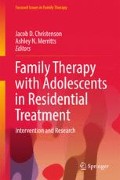Abstract
This chapter discusses Intervention techniques that may be used to assist individuals in late adolescence who need treatment for substance use disorders, eating disorders , and other types of compulsive behaviors . Data on the prevalence of drug and alcohol use and abuse among adolescents in the United States is outlined along with the economic impact of these diseases and disorders. In addition, the negative effect on family systems is detailed. Importantly, information on the four primary Intervention techniques practiced in the United States is presented. These include the Johnson Institute Model, the ARISE (a relational intervention sequence for engagement) Model, the Family Systems Model and the Nouthetic Model. Each protocol is outlined so the reader may have a better understanding of these models and how the use of these techniques may be effective in not only encouraging afflicted individuals to accept help but also in supporting families through the process of recovery .
Access this chapter
Tax calculation will be finalised at checkout
Purchases are for personal use only
References
Adams, J. E. (1970). Competent to counsel. Grand Rapids, MI: Zondervan.
Addiction Recovery Consulting Services. (2015). San Francisco interventionists: Intervention models. Retrieved from: http://www.bayarea-intervention.com/interventionmodels.html
Alcoholics Anonymous. (2001). Alcoholic anonymous (4th ed.). New York: Alcoholics Anonymous World Services, Inc.
American Psychiatric Association. (2000). Diagnostic and statistical manual of mental disorders (4th ed.). Arlington, VA: Author.
American Society of Addiction Medicine. (2005). Public policy statement on the definition of alcoholism. Retrieved from: http://www.asam.org/docs/default-source/public-policy-statements/1definition-of-alcoholism-2-902.pdf?sfvrsn=0
Anderson, N. T., Zuehlke, T. E., & Zuehlke, J. S. (2000). Christ centered therapy. Grand Rapids, MI: Zondervan.
Belzman, M. (2003). Handbook for Christ-centered substance abuse and addiction counselors. Redlands, CA: Association of Christian Alcohol and Drug Counselors.
Brown, S. (1985). Treating the alcoholic. New York: John Wiley and Sons.
Brown, S., & Lewis, V. (1996). The alcoholic family in recovery. New York: The Guilford Press.
Clinton, T., Hart, A., & Ohlschlager, G. (Eds.). (2006). Caring for people God’s way: Personal and Emotional Issues, Addictions, Grief, and Trauma. Nashville: Thomas Nelson.
Crabb, L. (1977). Effective Christian counseling. Grand Rapids: Zonervan.
Distance Learning Center. (2005). Getting ready to test: A review/preparation manual for drug and alcohol credentialing examinations. Santa Fe, NM: Author.
Dupont, R. L. (1997). The selfish brain. Center City, MN: Hazelden.
Fingarette, H. (1988). Heavy drinking: The myth of alcoholism as a disease. Berkeley, CA: University of California Press.
Fitzgerald, W. K. (2002). Alcoholism the genetic inheritance. Lake Forest, Illinois: Whales’ Tale Press.
Garrett, J., Landau-Stanton, J., Stanton, M. D., Stellato-Kabat, J., & Stellato-Kabat, D. (1997). ARISE: A method for engaging reluctant alcohol and drug dependent individuals in treatment. Journal of Substance Abuse Treatment, 14(3), 235–248.
Harwood, H. J. (2000). Updating estimates of the economic costs of alcohol abuse in the United States: Estimates, update methods, and data. Washington, DC: US Department of Health and Human Services, Public Health Service, National Institutes of Health, National Institute on Alcohol Abuse and Alcoholism.
Jay, J., & Jay, D. (2000). Love first: A new approach to intervention for alcoholism & drug addiction. Center City, MN: Hazelden.
Johnson, V. E. (1986). Intervention: A step-by-step guide for families and friends of chemically dependent persons. Center City, MN: Hazelden.
Julie Kelly & Associates. (2015). The joy of recovery. Retrieved from: http://www.joyofrecovery.com/index.html
Ketcham, K., & Asbury, W. (2000). Beyond the influence: Understanding and defeating alcoholism. New York: Bantam Books.
Landau, J., & Garrett, J. (2006). Invitational intervention: A step by step guide for clinicians helping families engage resistant substance abusers in treatment. Boulder, CO: Book Surge.
Liepman, M. R. (1993). Using family influence to motivate alcoholics to enter treatment: The Johnson Institute intervention approach. In T. J. O’Farrell (Ed.), Treating alcohol problems: Marital and family interventions. New York: The Guilford Press.
Martin, J. C. (1973). Chalk talks about alcohol. San Francisco: Harper Collins.
May, G. G. (1991). Addiction and grace: Love and spirituality in the healing of addictions. New York: HarperCollins.
National Institute of Drug Abuse. (2016). Trends and statistics. Retrieved from: https://www.drugabuse.gov/related-topics/trends-statistics#costs
Peele, S., & Brodsky, A. (1991). The truth about addiction and recovery. New York: Fireside.
Raiter, W. J., & Towle, J. A. (2006). The moment of change. Nashville, TN: Presentation at the conference for Foundations Associates.
Spickard, A., & Thompson, B. R. (2005). Dying for a drink. Nashville: W Publishing Group.
Substance Abuse and Mental Health Services Administration. (2014). Results from the 2013 National Survey on Drug Use and Health: Summary of national findings. NSDUH Series H-48, HHS Publication No. (SMA) 14-4863. Rockville, MD: Substance Abuse and Mental Health Services Administration.
Vaillant, G. E. (1995). The natural history of alcoholism revisited. Cambridge: Harvard University Press.
Wainwright, A. T., & Poznanovich, R. (2007). It’s not okay to be a cannibal. Center City, MN: Hazelden.
Wandzilak, K. (2006). The moment of change. Nashville, TN: Presentation presented at the conference Foundations Associates.
White, R. K., & Wright, D. G. (Eds.). (1998). Addiction intervention: Strategies to motivate treatment-seeking behavior. New York, NY: Haworth Press.
Author information
Authors and Affiliations
Corresponding author
Editor information
Editors and Affiliations
Rights and permissions
Copyright information
© 2017 Springer International Publishing AG
About this chapter
Cite this chapter
Law, J.L. (2017). Intervention: The First Step to Recovery from Addiction. In: Christenson, J., Merritts, A. (eds) Family Therapy with Adolescents in Residential Treatment. Focused Issues in Family Therapy. Springer, Cham. https://doi.org/10.1007/978-3-319-51747-6_12
Download citation
DOI: https://doi.org/10.1007/978-3-319-51747-6_12
Published:
Publisher Name: Springer, Cham
Print ISBN: 978-3-319-51746-9
Online ISBN: 978-3-319-51747-6
eBook Packages: Behavioral Science and PsychologyBehavioral Science and Psychology (R0)

